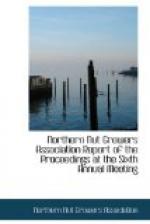as well as some grafted persimmons of named varieties.
In my statement in the
American Nut Journal
last May or June I mentioned that all the grafted
persimmons sent from Washington were winter-killed.
I find on returning in August that the Early Golden
is very much alive. Twelve other varieties have
been planted to see what this winter will do to them.
The persimmon is exceedingly interesting to us northern
nut growers because where it will succeed the pecan
will also, without a doubt. Now I also find that
my statement in the same paper that the grafted pecans
sent by Mr. Reed were winter-killed was an error,
as only certain trees failed to grow above the graft.
Those that are growing are the Major, Busseron and
Indiana, the Busseron showing most decidedly better
than the Indiana, both here and at Toronto. All
pecans lived, both here and at Toronto, if I include
those that sprung up below the graft. Out of
thirteen varieties that I experimented with at Toronto,
Major, Posey and Niblack were the only ones that lived
well above the graft and showed no winter-killing.
Others were more or less winter-killed. Kentucky,
Mantura, Appomattox, Luce and Greenriver showed no
desire to live in the north. Mr. Pomeroy’s
English walnuts showed a most distinct dislike for
Toronto, but all forty-eight are doing well here and
are being cared for.
Colonel Sober’s Paragon chestnuts showed the
most determined attempt to not grow the Paragon part
of the tree, and an equally determined mind to grow
good and strong below the Paragon part—may
this part yield good trees! I have three or four
Paragons left out of 135 trees. Pecans grew as
many as four feet both here and at Toronto this summer.
Of the new trees sent from Washington two specimens
of Castanea Crenata (from the north Island of Japan),
six specimens of Castanea Mollissima (almost blight
proof, from north China) all are thriving.
Juglans regia sinensis lived to the tip through the
winter and budded out strong from the top, as did
J. cordiformis—may it always be so.
Re Dr. Deming’s question as to the farthermost
northern pecans I said Charles City, Iowa. Now
these forty trees were planted twenty years ago and
are all alive and yield crops, but the nuts are small
as they are seedlings. Write Mr. Charles D. Patten
re how his trees are doing and their history.
He has been asking Mr. Reed for scions of better trees.
I have five types of soil to grow my trees in, stiff
clay, rich gravel, quicksand and humus, light sand
and silt or bottom land, well drained. I have
no sour, undrained spot on my fifteen acres.
APPENDIX
PRESENT AT THE SIXTH ANNUAL MEETING OF THE NORTHERN
NUT GROWERS ASSOCIATION




